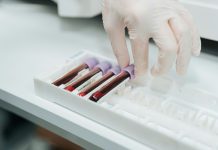
Scientists from Umeå University in Sweden found that people who drink large amounts of alcohol have nearly fivefold odds of experiencing a potentially deadly type of stroke compared with those who drink very little or not at all.
The research is published in Stroke and was conducted by Dr. Kristina Johansson et al.
In the study, the team looked at blood concentrations of phosphatidylethanol (PEth), a biomarker reflecting alcohol consumption over the past month.
They tested 277 middle-aged men and women in Sweden.
They found the risk of having a bleeding stroke during the 22-year study was nearly five times higher for those with the highest PEth blood concentrations than those with the lowest concentrations.
Bleeding stroke is a type of stroke caused by a blood vessel rupture that leads to bleeding in the brain. The strokes occurred, on average, within seven years of the blood test.
PEth measurements don’t indicate frequency or volume of drinking, only whether alcohol was in the system in recent weeks.
Researchers used PEth results to divide study participants into groups: heavy drinkers, moderate drinkers and those who drank very little or not at all.
For those who drink alcohol, the AHA recommends men limit it to one or two drinks per day and women one drink per day.
Previous studies linking alcohol consumption to increased risk of ICH have relied on self-reported alcohol use. The new study found that self-reported alcohol use was not effective at predicting risk for future strokes.
Bleeding stroke is the second most common type of stroke in the United States, with an estimated mortality rate of about 40% within one month of the stroke. It also can cause severe disability in those who survive.
If you care about stroke, please read studies that salt substitute could effectively prevent stroke, and chocolate may help reduce stroke risk.
For more information about stroke, please see recent studies about a major cause of stroke, and results showing common nausea drugs may increase the risk of stroke.
Copyright © 2022 Knowridge Science Report. All rights reserved.



